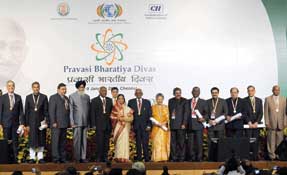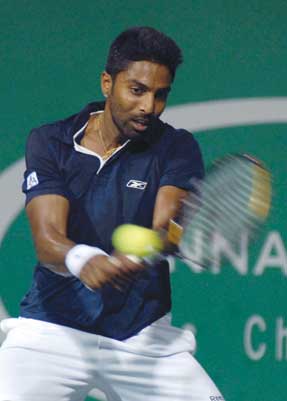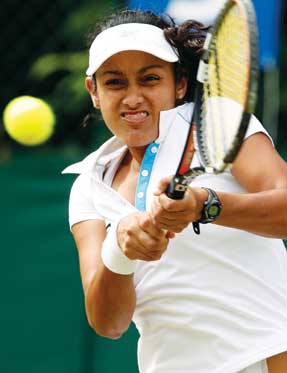Magazine
Not Required Indians?

Without an Indian passport you can no longer represent your ancestral homeland in international sports events. A look at what this latest policy diktat from the Indian government means for 20 million overseas Indians worldwide
|
So, you thought “NRI” stood for Non Resident Indian? In the gloomy corridors of India’s Sports Ministry in New Delhi, the acronym these days has acquired a new variant: Not Required Indians. Henceforth, only players with Indian passports — i.e. true-blue Indian citizens, not People of Indian Origin (PIOs) or even Overseas Citizens of India (OCIs) — will enjoy the privilege of wearing the country’s colors at international sports events, according to a federal government release. You can have your annual Bharatiya Pravasi Diwas and such other glittering melas sponsored by a fawning and indulgent Indian Government. But being an ethnic Indian is not enough evidence of national identity, without that pocket-sized determinant of Bharatiya citizenship: the Indian passport.
Until the new directive, two basic rights associated with Indian citizenship remained out of the reach of overseas Indians who opted to become citizens of another country — the right to own agricultural land and some constraints on property ownership in India, and the right to vote in Indian elections and to hold government posts, including those of president and prime minister. Now add a third: the right to represent India in international tournaments. The two previous strictures weren’t problematic for most overseas Indian. An Indian without an Indian passport is still Indian enough to know the tricks of circumventing laws anywhere, and particularly in India. Many NRIs routinely purchase “benami” property back home — that is, property paid by them, but whose title is acquired in the name of another, typically a spouse or close family member. Which explains why several non resident Indian couples have one spouse opting for U.S. citizenship, while the other retains the “green card” of permanent residency. As for voting and politics, few Indians living abroad as expats cared to vote even when they lived in India. The economically better-endowed class everywhere — which characterizes the majority of the Indian diaspora in Europe and North America — is particularly notorious for its political apathy. Besides, few Indians settled abroad aspire to become politicians or government servants in India. Even those bitten by the political bug — like Keith Vaz in the United Kingdom and Bobby Jindal in the United States — prefer the political ladder in their new home. But the sting in the latest deprivation is sure to hurt. In one fell blow, its delivery timed rather inconsiderately during the holiday season between Christmas and New Year, the Indian Government pulled the rug from under a host of players whose parents are of Indian origin but who themselves acquired non-Indian citizenship by reason of birth or choice. And, in the process, it shattered the dreams of diasporic Indians who had set their sights on an international sports career. An estimated 20 million-plus persons of Indian descent who are not Indian citizens live outside India, according to 2001 census data, and another six million non resident Indians have retained their Indian passports.
Rather curiously though, the spark that lit this fire came from a family that resides in India, and therefore technically speaking, is not part of the Indian diaspora. Rahul Kumar was born in the UK, and so is a British citizen, who relocated to Delhi with his wife who still remains a citizen of India. Both are of Indian origin. Rahul’s son Karm was born in India, but acquired a British passport by virtue of his father’s citizenship, although Karm himself has never set foot on British soil. When Karm, a strapping teenager with a noticeable talent for squash, was dropped by the Squash Racquet Federation of India from the selection trials for the 2010 Commonwealth Games, Rahul Kumar filed a writ petition in the Delhi High Court citing his son’s constitutional rights and complaining of “nepotism, corruption, and power politics” in the selection process. And when the issue of Karm’s citizenship was raised, the petitioner pointed to the case of Prakash Amritraj — a U.S. passport holder who has been representing India in Davis Cup matches for five years. Piqued at the differing selection standards applied by various sports federations, the High Court called on the federal government to announce a uniform policy. The government claims it sought the opinions of sports bodies, such as the National Sports Federations and the Indian Olympic Association, most of whom whole-heartedly supported the exclusion of non-citizens. As a result, the Sports Ministry announced that it was “restricting the representation of India in international sports events to players who are citizens of India.” Despite whispers about a possible reconsideration of the policy, insiders are convinced that only the introduction of dual-citizenship would make any difference. Such a move is nowhere on the horizon. But as it stands today, the policy, whose stated aim is to promote home-grown sports talent, threatens to draw the curtains on at least four budding tennis careers. Prakash Amritraj, Sunitha Rao, and the two Uberoi sisters, Shikha and Neha are rising tennis stars, all U.S. citizens, representing India in the Davis Cup, Fed Cup and other international team tournaments, including the Olympics. Prakash, former Indian tennis great Vijay Amritraj’s son, is on the Davis Cup squad. Sunitha Rao teamed up with India’s current tennis star Sania Mirza in the Fed Cup and at the Beijing Olympics. Shikha Uberoi, born in Mumbai of parents who migrated to the U.S., has had a career-high singles world ranking of 122 in 2005, and 87 playing doubles. She was the silver medallist at the 2006 Doha Asian Games.
Tennis, it turns out, finds itself wrong-footed by a government order which was actually provoked by discontent in squash. Indian tennis had sailed along smoothly with unopposed representation by non-citizens until the game became the new policy’s hardest-hit victim. Today, the All-India Tennis Association is in a real quandary. In the midst of preparing for upcoming Davis and Fed Cup matches, its officials face the onerous task of having to drop players on whom they have expended considerable resources during training, unless those players relinquish their U.S. citizenships and acquire an Indian one. Shikha Underoi has announced she will relinquish her American citizenship and revalidate her old Indian passport to keep playing for India. The Indian bench strength inspires little confidence. At 210, Prakash Amritraj is among the top-ranked players in Indian tennis. The Indian “citizens” in the sport after him are Rohan Bopanna at 333, Harsh Mankad at 564, and Divij Sharan at 701. Among women, the situation is no better. Drop Sunitha Rao (ranked 197), and your next best choice is Isha Lakhani at 362. All of which bodes poorly for the country’s performance in international tennis at least for the near future. Critics complain the Indian Government has shot itself in the foot? Will our immediate losses in national prestige and ranking in international sport outweigh whatever nebulous gains that might accrue in the long run from this policy decision? Are we being unfair — even cruel — to a growing generation of foreign-born kids of Indian descent who will be deprived of representing their homeland in international sport because of a paper technicality? In this era of rampant and seemingly irreversible globalization, are we needlessly inflating the value of national identity and, by extension, of a passport — a document that seems to come in handy only during international travel? Overall, is the policy decision a retrograde step toward narrow-minded chauvinism? Many overseas Indians are chafing over the new sports policy. Already incensed that the Indian Government earlier dangled the bait of “dual citizenship” only to offer PIO and OCI cards (see box) of dubious worth, they view this latest exclusionary policy as another stab in the back. It prompted a few to even contemplate a boycott of last month’s Bharatiya Pravasi Diwas in Chennai.
Their dominant feeling is a sense of disappointment and betrayal. If India could recognize its non residents as potentially important sources of capital inflow and international contacts, and could value their talent and services to the point of setting up a separate Ministry for Overseas Indian Affairs, was it too much to ask that their kids be allowed to wear the country’s colors in sporting events? If an Italian-born foreigner like Sonia Gandhi could be offered India’s prime ministership, and can run the country albeit by remote control, why stop a person of Indian descent from bringing sporting glory to the nation? Critics of the new government policy have also drawn parallels with the country’s economic liberalization. The Indian economy grew faster during the post-1991 reforms when industrial and business sectors were opened up to foreign investment. Similarly, Indian sports benefit from an infusion of foreign-born Indian skills to rev up local talent. If India has no qualms about sending its players abroad for training and even hiring foreign coaches, it is argued, what’s the harm in accommodating players of Indian descent if they hold foreign passports? The harm is potentially enormous for local players who, with a comparable level of talent, linger — and ultimately wither — in the shadow of those whose fortuitous circumstance of birth afford them lop-sided advantages. Local players have to struggle with limited facilities while their imported counterparts train abroad under expert coaches and avail of high-grade sporting infrastructure. For every local success story, such as Leander Paes and Mahesh Bhupathi who made a mark, there are scores of other talented players who remain forever unknown. Unless the trend is snapped, it is bound to create a generational mind-set of perpetual dependency. Perhaps an embarassing decline in India’s international sports rankings might help kick-start the complacent bureaucracy into improving the existing grass-root sports infrastructure after years of merely waiting around for the next NRI kid to be delivered to them every now and then on a platter. Supporters of the policy also contend that national sports pride should not be on sale. The pride of Indian sportesmen should not be usurped by pretenders whose end-goal may well be to exploit Indian sports for international exposure. Who honestly believes that Prakash Amritraj and other overseas Indian sportsmen would clamour to play for India had they been good enough to be selected for the US Davis Cup team? And is the ease of foreign travel reason enough to hold tenaciously to an American passport? Critics also decry the propensity of some Indians to deify borrowed heroes who exhibit unabashed alien loyalties? Indians unquestioningly embraced half-Indian US-based astronaut Sunita Williams after her historic NASA space mission, even though her U.S. loyalties are transparent. Williams was born in America, lived and worked there and married an American. Viewed from the prism of international law, the controversy is uncomplicated. Here’s a quick and simple solution to this whole controversy. Under international law, nationality together with its correlative, citizenship — and not ethnicity together with its correlative, kinship — are the determinants of national identity in the modern world. India, in the United Nations as much as in the Olympics, is first and last a nation, a political rather an ethnic identity. And your allegiance as an international sportsman — and therefore, your loyalty — is to the country of your citizenship and its flag, not to your ethnic group. Very simply, politics overrides biology. Which explains why Sonia Gandhi, after naturalization as an Indian citizen in 1983, enjoys all the privileges of citizenship despite her Italian genes. The inherent grace and broad-minded vision of the Indian Constitution, which, unlike its US counterpart, does not distinguish between natural born and naturalized citizens, permits her to aspire for the highest political post in the land, whereas the American Constitution does not countenance a presidential aspirant born outside the United States. Madam Gandhi, the NRI — Non resident Italian — does not quite have the same opportunities in her native Italy, whose citizenship she was forced to abandon at the time she acquired Indian citizenship in 1983.
|





You must be logged in to post a comment Login